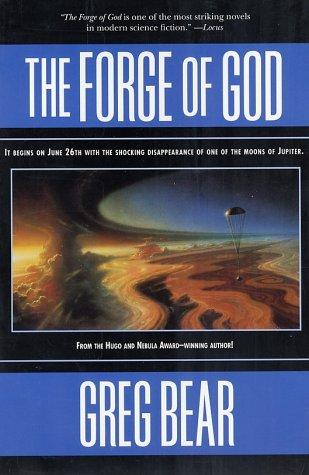Chris reviewed The Forge of God by Greg Bear
None
3 stars
This is a book about the end of the world. The cataclysm comes after mysterious artefacts, apparently part of the natural world but not quite good enough fakes to pass muster, appear in parts of Australia, Mongolia and the USA. A dying alien gives a message of impending doom.
The engine of destruction - possibly neutrino/antineutrino bombs at the earth's core - gives the people of Earth time enough to realise that few if any will live to tell the tale; and the novel, whose parts are headed with lines from the Requiem Mass, is the story of some of those who will die, some who will survive (there's a counter-movement, as there is in these things; hardly any authors are rash enough to destroy humanity entirely while breaking up the planet). The death of Earth is mirrored in the slow death of a man stricken with cancer, and much of the story is seen from the viewpoint of his friends as they come to terms with his death and their own. In the novel's large-scale setpiece near the end, an iconic piece of American landscape is torn apart, the part standing in for the whole of the world, but even there the abiding image is of people riding the collapsing landscape down. '"I don't want that ... panic, when it comes. I want to know and sit and watch as much of it as I can. Maybe that's the best seat in the house." He pointed to the mottled rock face. "Up on top somewhere."' (p. 373).
The characterisation, the building of personalities within the framework of the story, is what makes this novel stand out from others on a similar theme. Greg Bear has populated his world with believable characters, and the loss of each one of them is mapped out. His characters are tested in the furnace that gives the novel its name - the final test, what do you do if you know that you and all those around you are going to die, and even fighting is futile? And what if you know that you will survive but billions will not? Many of them rage against the dying of the light, as Dylan Thomas put it, but in the end the light dies anyway. "We've been sitting in our tree chriping like foolish birds for over a century now, wondering why no other birds answered . The galactic skies are full of hawks, that's why." (p. 315).

